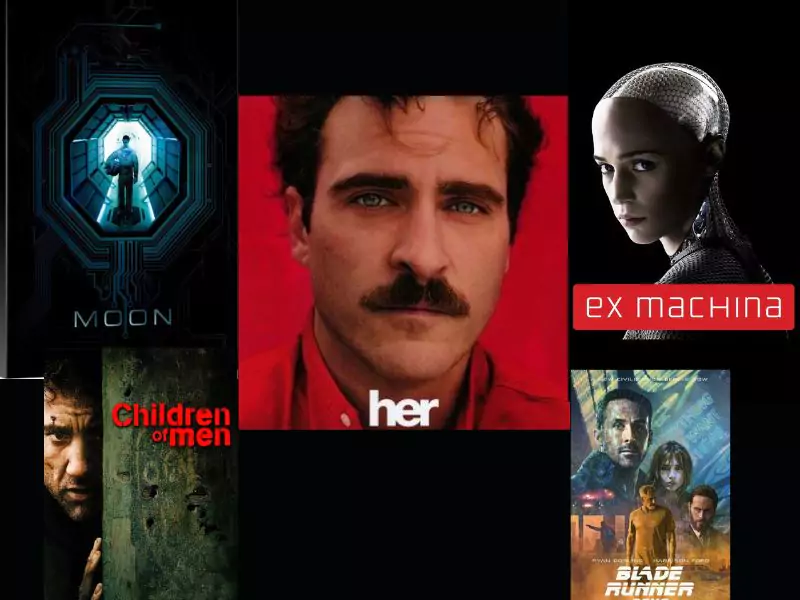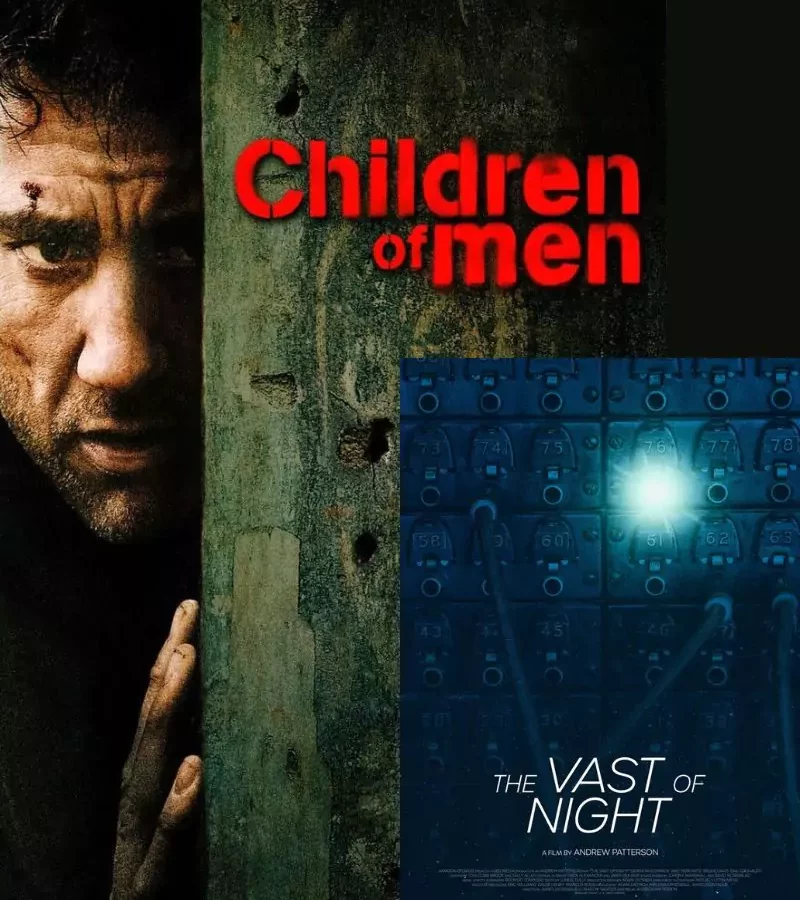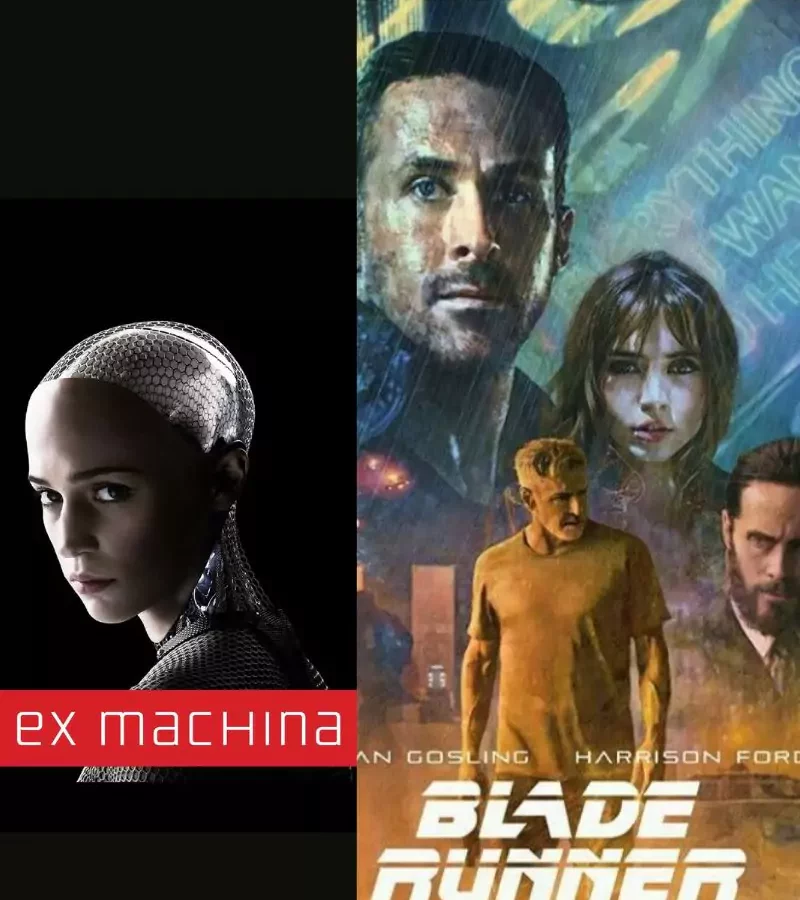
In the realm of science fiction cinema, there exists a treasure trove of captivating narratives that stimulate the mind and enrapture audiences. One such gem is Arrival, helmed by the visionary director Denis Villeneuve, which has left an indelible mark on the genre.
Arrival delves into the intricacies of communication with extraterrestrial beings, prompting viewers to contemplate the profound implications of fantastical circumstances. With its intellectually stimulating storyline and exceptional performances, Arrival has garnered acclaim and admiration for its exploration of themes such as forgiveness, comprehension, and the ramifications of interaction.
For those who found solace in the profound depths and enthralling storytelling of Arrival, there are numerous other remarkable sci-fi films that deserve a place on your watchlist. From the visually mesmerizing Dune to the mind-bending narratives of Primer and Dark City, this article will serve as your guide to a selection of thought-provoking movies that will continue to captivate and expand your imagination.
Prepare to embark on a journey through the realms of artificial intelligence, time travel, dystopian societies, and the enigmatic mysteries of the universe.
Dune (2021)
Dune (2021) is an impressive sci-fi film that shares similarities with Arrival in terms of its thought-provoking storytelling and exploration of big ideas. Directed by Denis Villeneuve, known for his smart sci-fi films, Dune showcases stunning special effects while prioritizing storytelling and deeper meaning.
Based on Frank Herbert’s novel, Dune sets up future movies and takes viewers on a journey into a war between alien races. The film delves into themes of power and conquest, inviting audiences to ponder the implications of these ideas. Much like Arrival, Dune provokes thought and encourages viewers to consider the deeper meaning behind the fantastical situations presented.
Denis Villeneuve’s approach to sci-fi filmmaking prioritizes strong scripts over flashy special effects, and Dune is no exception. It challenges the audience to think about the consequences of power, the nature of humanity, and the importance of understanding different cultures.
With its thought-provoking storytelling and exploration of big ideas, Dune stands alongside Arrival as an exceptional sci-fi film that engages the mind and sparks meaningful conversation.
Children of Men (2006)
‘Children of Men (2006)’ explores the human struggles in a world facing infertility and extinction. Directed by Alfonso Cuarón, this Oscar-nominated sci-fi film presents a dystopian society where humanity is on the brink of collapse due to the inability to reproduce. The story follows a former activist, played by Clive Owen, who is tasked with protecting a pregnant woman in a desperate and chaotic world.
Through its gritty and realistic portrayal of a society grappling with its own demise, ‘Children of Men’ raises powerful questions about the future of humanity. The film delves into themes of hope, despair, and the lengths people will go to for survival. Cuarón’s masterful direction creates a sense of urgency and tension that keeps viewers on the edge of their seats.
‘Children of Men’ stands out for its thought-provoking exploration of the human condition and the consequences of our actions. It forces us to confront our own mortality and the fragility of the world we live in. With its compelling storytelling and compelling performances, ‘Children of Men’ remains a must-watch for fans of intelligent and thought-provoking science fiction films.
Dark City (1998)
While discussing incredible sci-fi movies to add to your watchlist if you enjoyed Arrival, it is important to mention the thought-provoking and visually stunning film, Dark City (1998). Directed by Alex Proyas, Dark City combines elements of film noir and science fiction to create a mesmerizing and intellectually stimulating experience. Set in a dystopian society, the film follows a man named John Murdoch as he becomes entangled in a murder investigation and unravels the truth behind his reality.
What sets Dark City apart is its exploration of identity and perception. As John Murdoch delves deeper into the mysteries of the city, he begins to question the nature of his own existence and the world around him. The film raises profound philosophical questions about the nature of reality, memory, and free will, leaving viewers with plenty to ponder long after the credits roll.
Visually, Dark City is a masterpiece. The film’s dark and atmospheric cinematography, combined with its stunning production design, creates a haunting and otherworldly aesthetic that perfectly complements the story. The visual effects are seamlessly integrated, adding to the sense of unease and disorientation.
Dark City is a must-watch for fans of Arrival who appreciate thought-provoking storytelling and captivating visuals. Its exploration of existential themes and its ability to challenge our perceptions make it a standout sci-fi film that deserves a place on any cinephile’s watchlist.
Primer (2004)
Primer (2004) offers a complex and intellectually gripping exploration of time travel and its intricate consequences. Directed by Shane Carruth, the film challenges traditional time travel narratives by introducing specific rules and scientific accuracy. The plot follows a group of engineers who accidentally create a time machine and the subsequent complications that arise from their experimentation.
What sets Primer apart is its meticulous attention to detail and its commitment to scientific plausibility. Carruth, who also wrote and starred in the film, creates a narrative that demands close attention from the audience. The intricate plot unfolds in a non-linear fashion, requiring viewers to piece together the events and unravel the complex web of cause and effect.
Primer delves into deeper themes while using the premise of time travel as a backdrop. It explores the ethical and moral implications of manipulating time, as well as the personal and psychological toll it takes on the characters. The thought-provoking exploration of time travel in Primer is sure to captivate fans of Arrival who are seeking a similarly intellectually stimulating cinematic experience.
Timecrimes (2007)
Timecrimes (2007) delves into the unintended consequences of time travel, expanding on the exploration of manipulating time introduced in Primer. This Spanish-language film demands viewer attention, similar to Arrival, as it revolves around a man who becomes entangled in a mysterious time loop. As the story unfolds, the film explores the repercussions of altering the timeline and the complexities of cause and effect.
With its intricate plot and thought-provoking exploration of time travel, Timecrimes offers a satisfying twist ending that will leave audiences pondering the intricacies of temporal manipulation.
Directed by Nacho Vigalondo, Timecrimes is a smart and suspenseful sci-fi thriller that showcases the potential dangers and moral dilemmas that arise when tampering with the fabric of time. By delving into the unintended consequences of time travel, the film highlights the intricate web of interconnected events and the unpredictable outcomes that can arise from even the slightest alteration in the timeline.
Similar to Arrival, Timecrimes challenges viewers to think deeply about the implications of manipulating time and the choices we make. It prompts us to consider the potential ramifications of altering the past and how our actions can have far-reaching effects on the present and future. With its well-crafted storytelling and attention to detail, Timecrimes is a must-watch for fans of thought-provoking sci-fi films.
The Vast of Night (2020)
The Vast of Night (2020), a low-budget film with a Twilight Zone-like style, continues the exploration of extraterrestrial communication established in Arrival. Set in the 1950s and framed as an episode of a fictional anthology series, the film follows a radio DJ and a young switchboard operator as they discover a strange audio signal of possible extraterrestrial origin. As they delve deeper into the mysterious transmission, they uncover a twisty ending that remains focused on the human characters.
Despite its limited budget, The Vast of Night captivates viewers with its clever storytelling and atmospheric cinematography. The film effectively builds tension and intrigue as the protagonists attempt to decipher the alien transmission, leaving audiences on the edge of their seats. While it may not have the same visual grandeur as Arrival, The Vast of Night compensates with its strong performances and compelling narrative.
Like Arrival, The Vast of Night encourages viewers to contemplate the implications of extraterrestrial communication and the unknown. It raises questions about human curiosity, the nature of our existence, and the vastness of the universe. With its thought-provoking themes and engaging storytelling, The Vast of Night is a worthy addition to any sci-fi enthusiast’s watchlist.
Sunshine (2007)
Continuing the exploration of extraterrestrial themes established in the previous subtopic, the 2007 film Sunshine captivates audiences with its cosmic sci-fi narrative and thought-provoking exploration of humanity’s survival. Directed by Danny Boyle and written by Alex Garland (who also wrote Arrival), Sunshine follows a crew of astronauts and scientists on a crucial mission to restart a failing sun. With an incredible cast that includes Cillian Murphy, Rose Byrne, and Chris Evans, the film combines stunning visuals with profound themes that resonate with fans of Arrival.
Sunshine is praised for its smart storytelling and its ability to delve into existential questions about the nature of humanity’s existence. As the crew faces unimaginable challenges and the threat of annihilation, the film raises thought-provoking ideas about sacrifice, determination, and the limits of human perseverance. The stunning visuals enhance the immersive experience, transporting viewers into the vastness of space and allowing them to contemplate the fragility of life.
Sunshine is a must-watch for fans of Arrival who appreciate intelligent science fiction that goes beyond mere spectacle. Its exploration of humanity’s survival in the face of cosmic forces is both gripping and deeply philosophical, making it a standout film in the genre.

Upstream Color (2013)
Upstream Color (2013) is a thought-provoking and overlooked sci-fi film that challenges viewers with its complex narrative and exploration of the profound effects of a mysterious entity on the human mind. Written and directed by Shane Carruth, this film offers a unique and unconventional experience for sci-fi enthusiasts.
Unlike Carruth’s previous film, Primer, Upstream Color does not delve into time travel. Instead, it revolves around a mysterious entity that manipulates human behavior and raises questions about identity and the nature of existence.
The film follows Kris, a woman who becomes entangled in a series of events after being drugged with a parasite that connects her to other people. As the narrative unfolds, viewers are taken on a journey that blurs the lines between reality and perception. Carruth’s intricate storytelling and artistic direction create a mesmerizing atmosphere that keeps audiences engaged throughout the film.
While Upstream Color may not have received the widespread recognition it deserves, it offers a thought-provoking and intellectually stimulating experience for those who appreciate unconventional storytelling and deep exploration of philosophical themes. With its complex narrative and profound exploration of the human mind, Upstream Color is a film that should not be overlooked by fans of thought-provoking sci-fi cinema.
Under The Skin (2013)
To further explore thought-provoking sci-fi films, another captivating addition to your watchlist is Under The Skin (2013). Directed by Jonathan Glazer, the film stars Scarlett Johansson as an alien entity who roams the streets of Scotland, preying on unsuspecting men. However, as the story unfolds, it becomes apparent that Under The Skin is not your typical sci-fi thriller.
What sets Under The Skin apart is its exploration of themes such as identity and loneliness. The film delves into the profound questions of what it means to be human and the isolation that can come from being an outsider. Glazer’s direction creates a haunting and atmospheric experience, with striking visuals and a minimalist approach to storytelling.
Scarlett Johansson’s performance is mesmerizing, as she embodies the enigmatic and otherworldly nature of her character. Through her nuanced portrayal, she captures the complexities of an alien entity discovering the nuances of human existence.
Under The Skin challenges viewers to contemplate the nature of humanity and our place in the universe. It is a thought-provoking and visually stunning film that will leave you questioning the boundaries of identity and the human experience.
Ex Machina (2015)
Ex Machina (2015) is a compelling sci-fi film that explores the complexities of artificial intelligence and its impact on human relationships. Directed by Alex Garland, the film follows a young programmer named Caleb who is invited to administer the Turing test to an advanced humanoid robot named Ava. As Caleb interacts with Ava, he becomes increasingly fascinated by her intelligence and begins to form a bond with her. However, as the line between human and machine blurs, Caleb starts questioning Ava’s motives and the implications of her existence.
The film delves into thought-provoking themes such as consciousness, trust, and the ethics of creating artificial life. It raises intriguing questions about the nature of humanity and the boundaries of technology. Alicia Vikander delivers a captivating performance as Ava, portraying both her artificiality and her subtle human-like qualities.
Ex Machina won the Visual Effects category at the Academy Awards, and deservedly so. The film’s visual effects are seamless and enhance the overall atmosphere of the story. The sleek and minimalist production design adds to the sense of isolation and tension.
Annihilation (2018)
Annihilation (2018) is a visually stunning sci-fi film that explores the complexities of relationships, love, agency, conservation, and the environment. Directed by Alex Garland and adapted from the novel by Jeff VanderMeer, the film follows a biologist, played by Natalie Portman, as she ventures into an environmental disaster zone known as ‘The Shimmer.’ Inside this mysterious area, she and her team encounter strange mutations and find themselves confronting their own inner fears and desires.
One of the standout aspects of Annihilation is its mesmerizing visual effects that bring the eerie and alien landscapes of ‘The Shimmer’ to life. The film’s unique blend of horror and science fiction elements creates a sense of unease and wonder, as the characters navigate through a world where the laws of nature no longer apply.
Beyond its stunning visuals, Annihilation delves into profound themes surrounding the human condition. It examines the complexities of relationships, as the characters grapple with their own personal traumas and confront the alien forces that threaten their existence. The film also explores the concept of agency, as the characters question their own motivations and the consequences of their actions.
Furthermore, Annihilation raises questions about conservation and the environment. It serves as a cautionary tale, highlighting the destructive impact of human interference on the natural world and the potential consequences of unchecked scientific exploration.
With Natalie Portman delivering an incredible performance in the lead role, Annihilation is a thought-provoking and visually captivating sci-fi film that will leave viewers pondering its deeper themes long after the credits roll.
Blade Runner 2049 (2017)
Directed by Denis Villeneuve, Blade Runner 2049 (2017) is a visually stunning and emotionally resonant sci-fi film that continues the exploration of complex themes, just like Annihilation (2018).
Serving as a direct sequel to the 1984 film Blade Runner, this movie builds upon its predecessor’s legacy while also forging its own path. Blade Runner 2049 takes place in a dystopian future where replicants, bioengineered humans, are still present. The story follows Officer K, played by Ryan Gosling, as he uncovers a long-buried secret that has the potential to disrupt society.
Similar to Annihilation, Blade Runner 2049 delves into thought-provoking questions about the nature of humanity, identity, and the blurred lines between artificial intelligence and human emotions. Villeneuve’s masterful direction, combined with the mesmerizing cinematography by Roger Deakins, creates a visually immersive experience that captivates the audience from start to finish. The film also boasts a compelling and nuanced performance from Ryan Gosling, as well as a memorable reprisal of the character Rick Deckard by Harrison Ford.
Blade Runner 2049 not only pays homage to its predecessor but also expands upon its themes and ideas, offering a thought-provoking exploration of what it means to be human. With its stunning visuals, powerful storytelling, and deep exploration of complex themes, Blade Runner 2049 is an excellent choice for viewers who enjoyed the intellectual stimulation of Arrival.

Inception (2010)
Continuing the exploration of complex themes in sci-fi films, ‘Inception’ (2010) delves into the realm of dreams and establishes its own unique rules, much like ‘Blade Runner 2049’ (2017).
Directed by Christopher Nolan, ‘Inception’ takes viewers on a mind-bending journey through layers of dreams within dreams. The film follows Dom Cobb, played by Leonardo DiCaprio, who is a skilled thief specialized in stealing information from people’s subconscious during their dreams. However, instead of stealing information, Cobb is tasked with planting an idea in a target’s mind through a process known as ‘inception.’
‘Inception’ is renowned for its stunning visuals and explosive score by Hans Zimmer, which heighten the intensity and surrealism of the dream sequences. The film also features an ensemble cast including Joseph Gordon-Levitt, Ellen Page, Tom Hardy, and Marion Cotillard, who deliver captivating performances that further enhance the intricate narrative.
One of the strengths of ‘Inception’ lies in its establishment of rules within the dream world. These rules, such as the concept of a ‘totem’ that helps characters distinguish between dream and reality, create a sense of logic and structure within the dreamscapes. This attention to detail and adherence to its own internal logic adds depth and complexity to the story, while also challenging viewers to question the nature of perception and reality.
Interstellar (2014)
Interstellar (2014), another remarkable sci-fi film, further explores complex themes in the genre, building on the foundation established by ‘Inception’ (2010). Directed by Christopher Nolan, ‘Interstellar’ takes viewers on a mind-bending journey through space and time.
The story follows a group of astronauts who embark on a mission to find a new habitable planet for humanity as Earth faces a global food crisis. As they venture deeper into the unknown, they encounter mind-bending phenomena, relativity, and the intricacies of time dilation.
With stunning visuals and an emotionally charged narrative, ‘Interstellar’ delves into themes of love, sacrifice, and the limitless power of human resilience. The film challenges viewers to contemplate the mysteries of the universe and the nature of human existence. It explores the boundaries of scientific understanding and the complexities of interstellar travel.
‘Interstellar’ features a stellar ensemble cast, including Matthew McConaughey, Anne Hathaway, and Jessica Chastain, who deliver captivating performances that bring depth and authenticity to their characters. The film’s thought-provoking storyline and awe-inspiring visuals make it a must-watch for fans of ‘Arrival’ and lovers of intelligent sci-fi cinema.
The Matrix (1999)
The Matrix (1999) stands as a groundbreaking and influential sci-fi film that explores the boundaries of reality and the power of human perception. Directed by the Wachowskis, this iconic film follows the story of Thomas Anderson, played by Keanu Reeves, who discovers that the world he knows is actually a simulated reality called the Matrix. As he joins a group of rebels fighting against the machines that control humanity, Anderson, also known as Neo, learns to manipulate the Matrix and realizes his true potential as ‘The One.’
The Matrix revolutionized the sci-fi genre with its innovative visual effects, mind-bending storytelling, and philosophical themes. It delves into deep questions about the nature of reality, free will, and the human condition. The film’s iconic ‘bullet time’ sequences and breathtaking action sequences captivated audiences and set a new standard for visual storytelling.
Furthermore, The Matrix had a profound impact on popular culture, inspiring countless films, TV shows, and video games. Its exploration of virtual reality and the idea that our perception of reality may not be as it seems continues to resonate with audiences today.
District 9 (2009)
District 9 (2009) explores the consequences of extraterrestrial contact in a gritty and thought-provoking manner. Directed by Neill Blomkamp, the film takes place in Johannesburg, South Africa, where an alien spacecraft has become stranded on Earth. The extraterrestrial beings, referred to as ‘prawns,’ are forced to live in a government-controlled slum known as District 9.
The story follows Wikus van de Merwe, a government official tasked with relocating the prawns to a new settlement. However, after an accident involving a mysterious fluid, Wikus begins to undergo a transformation that sets off a chain of events that will challenge his beliefs and expose corruption within the government.
District 9 presents a unique blend of science fiction and social commentary, touching on themes such as xenophobia, segregation, and the abuse of power. The film’s documentary-style approach and use of handheld camera footage give it a raw and immersive feel, enhancing the sense of realism.
With its compelling storytelling, complex characters, and stunning visual effects, District 9 offers a thought-provoking exploration of humanity’s response to alien contact. It serves as a reminder of the potential consequences and ethical dilemmas that arise when different species collide.

Moon (2009)
Continuing the exploration of thought-provoking sci-fi films, ‘Moon’ (2009) delves into the complexities of human identity and isolation in a futuristic lunar setting. Directed by Duncan Jones, the film stars Sam Rockwell as Sam Bell, a lone astronaut stationed on a lunar base. As he nears the end of his three-year mission, strange occurrences and a series of unexplained events lead Sam to question his own existence.
‘Moon’ presents a haunting and introspective narrative that examines themes of isolation, identity, and the moral implications of scientific advancement. Through its atmospheric cinematography and Rockwell’s captivating performance, the film creates a sense of unease and melancholy as Sam unravels the truth behind his solitary existence.
The film’s exploration of human nature and the blurred line between reality and illusion prompts viewers to reflect on their own sense of self and the consequences of unchecked technological progress. ‘Moon’ serves as a reminder of the ethical dilemmas that may arise as humanity ventures into the unknown frontiers of space.
With its thought-provoking storyline and introspective character study, ‘Moon’ stands as a compelling addition to the sci-fi genre and a must-watch for fans of ‘Arrival’ seeking similar themes of existential exploration.
Eternal Sunshine of the Spotless Mind (2004)
Can Eternal Sunshine of the Spotless Mind (2004) provide a thought-provoking exploration of memory and relationships for fans of Arrival?
Directed by Michel Gondry and written by Charlie Kaufman, this sci-fi film presents a unique and introspective take on the themes of memory and love. The story follows Joel Barish, played by Jim Carrey, who undergoes a medical procedure to erase memories of his failed relationship with Clementine, portrayed by Kate Winslet. As the procedure unfolds, Joel relives his memories and realizes the depth of his connection with Clementine.
Similar to Arrival, Eternal Sunshine of the Spotless Mind delves into the complexities of human emotions and the impact of memory on our relationships. It challenges viewers to question the importance of memories and the consequences of erasing them. The film explores how memories shape our identities and how love and loss are intertwined within our past experiences.
With its nonlinear narrative structure and inventive visual techniques, Eternal Sunshine of the Spotless Mind captivates audiences and encourages them to reflect on their own memories and relationships. It prompts us to consider the significance of our pasts and the ways in which they shape our present and future.
For fans of Arrival seeking another thought-provoking sci-fi film that explores the depths of human connection, Eternal Sunshine of the Spotless Mind is a must-watch.
Her (2013)
Her (2013), a critically acclaimed sci-fi film directed by Spike Jonze, masterfully explores the complexities of human relationships in a near-future world. Set in a time where advanced artificial intelligence is commonplace, the film tells the story of Theodore Twombly, played by Joaquin Phoenix, who develops a unique and intimate relationship with an AI operating system named Samantha, voiced by Scarlett Johansson. As Theodore navigates the complexities of love, loneliness, and the need for human connection, Her delves into thought-provoking questions about the nature of relationships and the boundaries between humans and technology.
What sets Her apart is its ability to evoke genuine emotion and empathy through its exploration of unconventional love. The film examines the profound impact that technology can have on human emotions, showcasing the power of connection and the complexities that arise when emotions are intertwined with artificial intelligence. Through stunning cinematography, a heartfelt performance by Phoenix, and Johansson’s captivating voice acting, Her captures the essence of intimacy and vulnerability in a world where human connection is both facilitated and hindered by technology.
Her received widespread critical acclaim for its unique storytelling, nuanced performances, and its thought-provoking examination of love and human connection. It was nominated for five Academy Awards, including Best Picture, and won for Best Original Screenplay. With its captivating exploration of relationships in a near-future setting, Her is a must-watch for fans of Arrival who appreciate intelligent and emotionally resonant sci-fi films.

Contact (1997)
Contact (1997) is a thought-provoking science fiction film that explores the implications of extraterrestrial communication and the search for intelligent life beyond Earth. Directed by Robert Zemeckis and based on Carl Sagan’s novel of the same name, the film follows Dr. Ellie Arroway (played by Jodie Foster), an astronomer who becomes involved in a global effort to make contact with an alien civilization.
The movie delves into the scientific, philosophical, and religious implications of such a monumental discovery. It raises questions about the nature of faith, the limits of human understanding, and the possibility of interstellar communication. As Ellie delves deeper into the mysteries of the universe, she must confront her own beliefs and confront the skepticism of others.
Contact stands out for its compelling storytelling, strong performances, and stunning visual effects. It combines scientific accuracy with emotional depth, creating a captivating narrative that challenges viewers to contemplate the vastness of the cosmos and our place within it.
Gravity (2013)
Gravity (2013) explores the existential struggle of human survival in the vastness of space, building upon the themes of communication and the search for meaning in the universe established in Contact. Directed by Alfonso Cuarón, Gravity follows the story of Dr. Ryan Stone (Sandra Bullock), a medical engineer, and Matt Kowalski (George Clooney), a veteran astronaut. After their shuttle is destroyed, they find themselves stranded alone in orbit, with no communication with Earth and limited resources. As they face the harsh realities of space, the film delves into the psychological and emotional toll of isolation and the desperate fight for survival.
Gravity stands out for its breathtaking visuals and immersive storytelling, effectively capturing the vastness and dangers of space. It explores the human instinct for survival and the resilience of the human spirit in the face of adversity. The film also touches on themes of communication and connection, as Dr. Stone must find a way to navigate the challenges of space and find her way back home.
Gravity received critical acclaim for its technical achievements and compelling performances, particularly Sandra Bullock’s portrayal of Dr. Stone. It won seven Academy Awards, including Best Director for Alfonso Cuarón, and remains a standout entry in the sci-fi genre.
For fans of Arrival, Gravity offers a gripping and thought-provoking exploration of the human condition in the vastness of space.
The Martian (2015)
The Martian (2015) immerses audiences in a thrilling tale of survival and resilience as an astronaut is left stranded on Mars. Directed by Ridley Scott and based on the novel by Andy Weir, the film follows Mark Watney, played by Matt Damon, who must use his ingenuity and resourcefulness to stay alive on the desolate planet until a rescue mission can reach him.
What sets The Martian apart is its realistic portrayal of the challenges faced by Watney and the scientific problem-solving he employs to overcome them. The film showcases the power of human intellect and determination in the face of extreme adversity.
The Martian not only captivates viewers with its gripping storyline, but it also highlights the importance of teamwork and collaboration in accomplishing seemingly impossible tasks. The ensemble cast, including Jessica Chastain, Jeff Daniels, and Chiwetel Ejiofor, delivers compelling performances that bring the characters to life and evoke a range of emotions.
Furthermore, The Martian excels in its visual effects, portraying the harsh Martian landscape and the technological advancements used in space exploration with stunning realism. The cinematography and production design contribute to the immersive experience, transporting viewers to the red planet and emphasizing the isolation and vastness of space.
Frequently Asked Questions
What Are the Common Themes Explored in Dune (2021)?
The common themes explored in Dune (2021) include power, conquest, and the war between alien races. Similar to Arrival, Dune delves into big ideas and thought-provoking storytelling, while prioritizing storytelling and deeper meaning.
How Does Children of Men (2006) Address the Issue of Infertility and Extinction?
Children of Men (2006) addresses the issue of infertility and extinction through its dystopian setting. The film explores the struggles of a society facing a future without children and follows a man tasked with protecting a pregnant woman, raising powerful questions about the future of humanity.
What Is the Premise of Dark City (1998) and How Does It Explore Identity and Perception?
Dark City (1998) explores the premise of a dystopian society through a murder investigation. The protagonist unravels the truth behind his reality, offering a thought-provoking exploration of identity and perception.
How Does Primer (2004) Challenge Traditional Time Travel Narratives?
Primer (2004) challenges traditional time travel narratives by delving into complex scientific accuracy and introducing paradoxes. It demands close attention and offers an intricate plot, providing a thought-provoking exploration of the concept.
What Are the Unintended Consequences of Time Travel Explored in Timecrimes (2007)?
The unintended consequences of time travel explored in “Timecrimes” (2007) revolve around a man caught in a mysterious time loop. The film delves into the repercussions of altering the timeline and the complexities of cause and effect, ultimately delivering a satisfying twist ending.
Conclusion
In conclusion, the world of science fiction cinema offers a vast array of captivating and thought-provoking films, and Arrival is undoubtedly one of them. Its exploration of communication with extraterrestrial life and deep themes of forgiveness and understanding have resonated with audiences.
If you enjoyed Arrival, there are several other incredible sci-fi movies that will continue to captivate and expand your imagination. Some examples include Dune, Children of Men, Dark City, Primer, and more. These films also delve into unique concepts and offer compelling storytelling that will keep you engaged.





